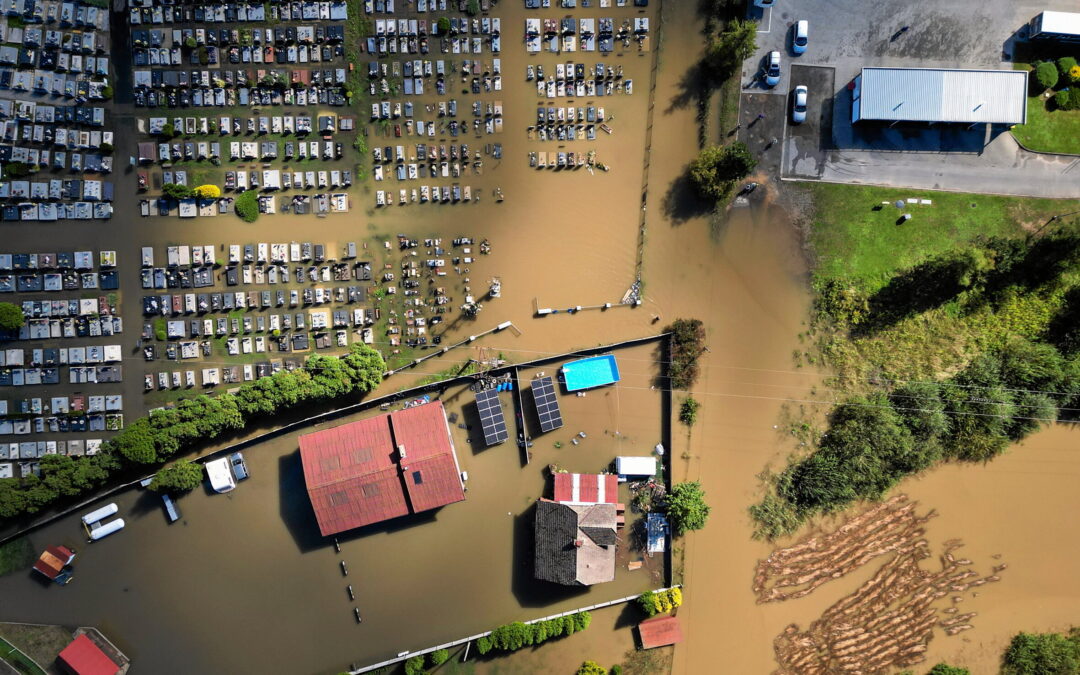The flooding that has hit many parts of Central Europe has claimed its first life in Poland, where southern parts of the country have been overwhelmed by torrential rain.
“The situation is very dramatic in many places,” said Prime Minister Donald Tusk on a visit today to the town of Kłodzko, near the border with the Czech Republic. The Kłodzko Valley has seen Poland’s worst flooding, with 1,600 people evacuated so far and 17,000 losing electricity.
In the towns of Stronie Śląskie and Lądek-Zdrój, the rivers have overflowed, flooding buildings and leaving the areas accessible only to the emergency services, reports the Polish Press Agency (PAP). A video from Stronie Śląskie showed one building completely destroyed by the surging waters.
Stronie Śląskie. Dom runął niczym pudełko z zapałek… Bardzo szybko przemieszcza się fala z pękniętej tamy. https://t.co/0Zco9KF9Hp pic.twitter.com/gRoZyxtg6C
— meteoprognoza.pl🇵🇱 (@MeteoprognozaPL) September 15, 2024
Tusk revealed that it was in Kłodzko County that the flooding had claimed its first life. “We have the first confirmed death by drowning,” he said, without identifying the victim.
The prime minister appealed to residents not to underestimate the threat of the floods and to obey evacuation orders, more of which he said were likely to be issued.
However, while he declared this morning that it was unlikely the dam in Stronie Śląskie would be breached by the water, later on Sunday the authorities confirmed that that had happened, reports news website Onet.
#PILNE: Tama w Stronu Śląskim nie wytrzymała. Wszystko jest zalewane.
film. @FaktyTVP3 Wrocław pic.twitter.com/GP04WPZ6W9
— Remiza.pl (@remizacompl) September 15, 2024
With travel impossible in some areas and some phone connections cut, Tusk also announced that the authorities would be deploying Starlink terminals, which provide internet connections through satellites operated by SpaceX.
“The first Starlinks are already operational, supporting connectivity and communication in flood-affected areas,” announced digital affairs minister Krzysztof Gawkowski on X.
“We are working on launching several dozen more devices to ensure communication between [rescue] services and the civilian population.”
Czechowice-Dziedzice, ul. Waryńskiego – aktualne zdjęcie z lotu ptaka. pic.twitter.com/yrKfwGLuX3
— Bielskie Drogi (@BielskieDrogi) September 15, 2024
Interior minister Tomasz Siemoniak added that a priority now is to restore road connections that have been cut by the flooding, as well as to provide residents with food and water. Amphibious vehicles were deployed this morning to carry this out.
Helicopters have also been deployed to assist in rescue and relief efforts, while 4,000 soldiers are on standby to assist the emergency services, said Siemoniak, quoted by broadcaster TVN.
Elsewhere in southern Poland, a bridge in the town of Głuchołazy was destroyed by a surge in the Biała Głuchołaska River. There are concerns this will form a barrier forcing more water into the town, which has already been flooded, reports news website Wirtualna Polska.
Moment porwania przez nurt mostu w Głuchołazach. #powódz pic.twitter.com/YyBBKRzO42
— Mischa von Jadczak (@michaljadczak) September 15, 2024
Meanwhile, the Vistula, the country’s longest river, flooded its banks in Kraków, Poland’s second-largest city. At 2 p.m. on Sunday, the city said the water level had reached 372cm, which is 2cm above the warning level. It is predicted to rise further, to around 400cm. The level classified as an emergency is 520cm.
Many other parts of Małopolska, the province in which Kraków is located, have also seen flooding today following heavy overnight rain.
In the nearby city of Bielsko-Biała, the Iłownica River reached a water level of 634 cm, which is 214 cm above the emergency level.

Notes from Poland is run by a small editorial team and published by an independent, non-profit foundation that is funded through donations from our readers. We cannot do what we do without your support.
Main image credit: Jakub Wlodek / Agencja Wyborcza.pl

Daniel Tilles is editor-in-chief of Notes from Poland. He has written on Polish affairs for a wide range of publications, including Foreign Policy, POLITICO Europe, EUobserver and Dziennik Gazeta Prawna.



















